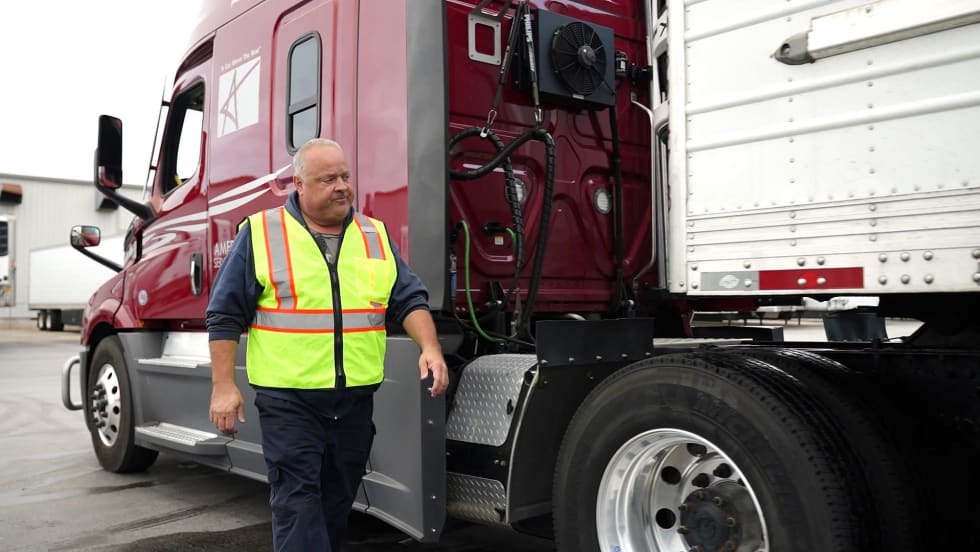Stress is a part of everyday reality. In fact, a certain amount is actually beneficial. But too much stress, or not learning to manage our stress, can destroy our health.
Stress is a part of everyday reality. In fact, a certain amount is actually beneficial. But too much stress, or not learning to manage our stress, can destroy our health. And heavy-duty truck drivers are subject to a lot of stressful situations.
Stress affects our ability to sleep, our mental focus, our immune system, our blood pressure, our ability to regulate blood sugars, and even our digestion.
In fact, chronic stress has been identified as a major factor in all illness and disease, because it diminishes our immune system and accelerates any illness or pre-existing condition.
Why Truck Drivers Are Under Stress
I cannot think of any workforce that deals with more stress on an ongoing basis than over-the-road truck drivers.
These stresses range from the family and relationship stresses of being away from home for long periods of time, to dealing with bad weather, traffic, distracted drivers, truck breakdowns, irregular sleep patterns, and noisy sleep environments.
Truck drivers deal with unfriendly and unempathetic personnel at shippers and receivers — and even in their own company’s office.
These are just some of the constant stresses that drivers deal with on an ongoing basis, leading to a massive increase in the risk for illness and disease.
Drivers are losing their CDLs or leaving the industry due to health issues. And considering how stress impacts mental focus, sleep and other health issues, it’s easy to see how chronic stress also increases the risk for accidents.
The Federal Motor Carrier Safety Administration’s Large Truck Crash Causation Study, which reviewed 141,000 trucking accidents over a 33-month period, found drivers reported “feeling pressured” as the leading cause in 16% of those crashes. Fatigue, often caused by chronic stress, was reported as the main cause in 18% of the accidents.
Being proactive by implementing strategies to reduce stress for drivers, as well as teaching drivers to better manage stress, will improve not only their health, but also their safety and productivity.
1. How Your Company Can Reduce Truck Driver Stress
The first step is identifying ways your organization can reduce the stress put on drivers. Obviously, there are things you can’t prevent, such as traffic and weather, but there are always items that can be tackled by an organization to reduce the stress on drivers.
Some of the most common stressors drivers cite include poor communication regarding pay expectations and home time expectations.
Communication with your fleet's truck drivers is something you CAN do something about.
2. Teach Truck Drivers Stress Management
The second step is teaching drivers to better manage stress.
The first and most effective technique is meditation and/or diaphragmatic breathing. This is a simple and proven way to reduce stress, calm down in any situation, and put yourself in a state where stressful events don’t have the same impact on your health.
There are many simple apps to help you learn meditation. A few of my favorites are Stop, Breathe, Think; Insight; Aura and 10% Happier. They all offer a variety of free meditations, as well as additional features.
Another great strategy for reducing stress is exercise.
Teach truck drivers a variety of exercise tools they can work into their lifestyle both on and off the road, including high-intensity cardio, functional strength training, and yoga, as well as physical activity such as walking, cycling, and swimming.
Exercise is critical for improving health and reducing stress. I always recommend walking before driving, as well as during the driver’s 30-minute break. This keeps blood flow going and stress levels down. There are also great yoga apps and yoga videos on YouTube.
With all the challenges facing the trucking industry, now and in the future, reducing stress for our drivers can have a significant impact on not only the health of our drivers, but also on safety, costs, retention and productivity. Those are more than enough reasons to make reducing stress for drivers a priority for your organization.
Sergio, a 2018 HDT Truck Fleet Innovator, has over 21 years of experience as a personal trainer, nutritionist and health coach. Certified in a variety of nutrition and fitness disciplines, he holds a bachelor’s degree in psychology, was a health expert for NBC for 11 years, and headed up wellness efforts for Hirschbach Motor Lines.
Related: Why You Should Care About Driver Wellness













